Bernie Sanders hasn't really faced scrutiny about his faith. That's about to change.
For the first time in recent memory, we have a serious presidential candidate who doesn't even pretend to regularly attend religious services. Will that become a problem?
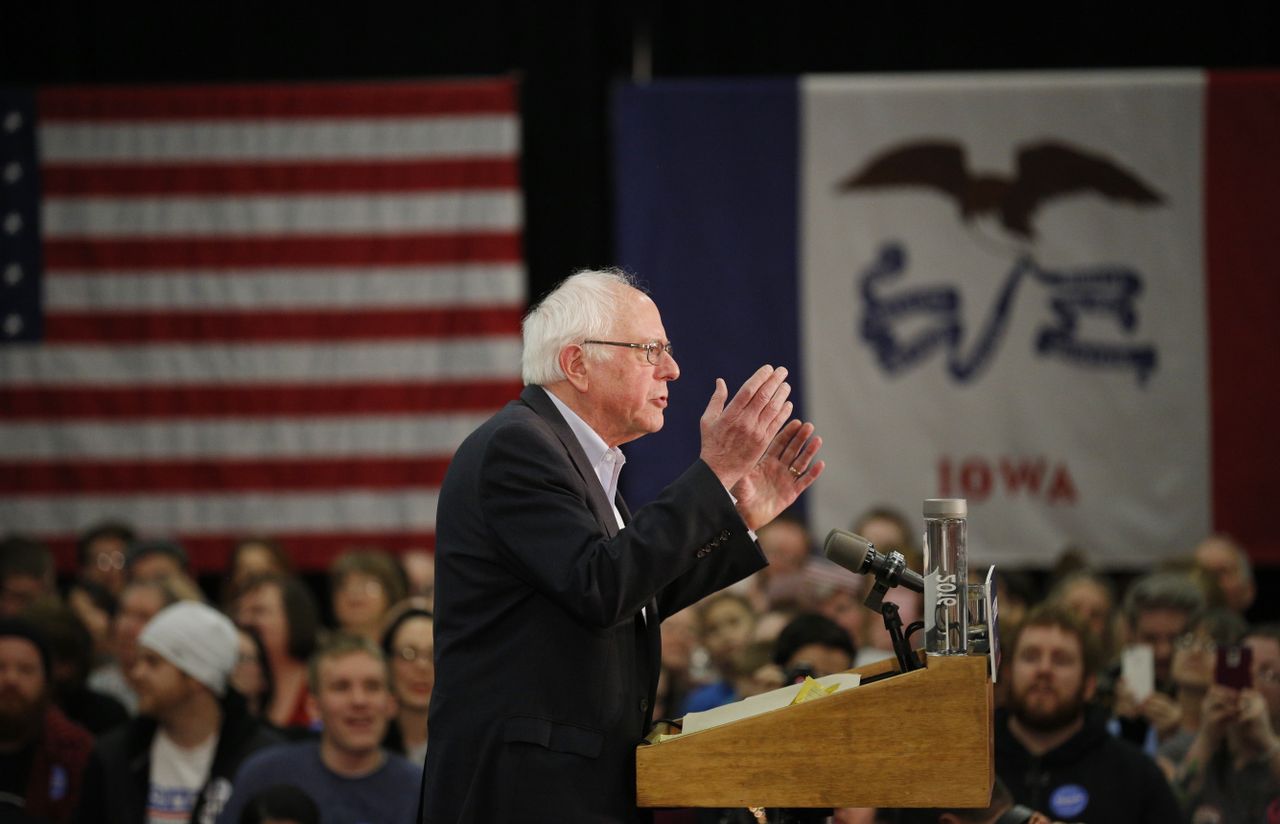
Until Tuesday night, no one had really questioned Bernie Sanders' Jewish faith. That changed almost immediately after he trounced fellow Democrat Hillary Clinton in the New Hampshire primary.
At a post-vote rally for Clinton, former Rep. Paul Hodes of New Hampshire, a Jewish Clinton surrogate, questioned Sanders' support for Israel — and his Jewishness — in comments to the Jewish Daily Forward. "Bernie is a secular Jew and I don't think his religion influenced his stance on Israel," said Hodes. "We know Hillary and we know she has an unshakeable bond with Israel, so this shouldn't pose a great dilemma for Jewish voters."
Hodes' tin ear comment will not sit well with many Jewish voters — who know that "secular" Jews aren't always "anti-Israel," and can embrace a range of views on the issue — but it does underscore how things might change for Sanders.
Subscribe to The Week
Escape your echo chamber. Get the facts behind the news, plus analysis from multiple perspectives.

Sign up for The Week's Free Newsletters
From our morning news briefing to a weekly Good News Newsletter, get the best of The Week delivered directly to your inbox.
From our morning news briefing to a weekly Good News Newsletter, get the best of The Week delivered directly to your inbox.
To date, the Vermont senator has largely been able to skirt the issue of his faith. This might be a function of Clinton's frontrunner status, but it might also be due to Sanders' relentlessly on-message campaign platform against greed, inequality, and corruption. His stance resonates by hitting a sweet spot of progressive voters — religious progressives opposed not only to the religious right's stance on social issues but also to its alliance with business interests. He also appeals to secular progressives weary of too much God-talk in presidential politics, a growing segment of the Democratic base. And because of his outsider status, no one has expected him to adapt to the party's efforts appeal to "values voters" or to address concerns that the Obama administration is insufficiently "friendly" to religion.
Even when Sanders has been asked about his faith, he doesn't invoke God or his own particular religious experiences. He offers no sentimental accounts of his Bar Mitzvah or a revelatory moment with a favorite rabbi. He wasn't even asked to explain what he was doing speaking at Liberty University, an evangelical college, on Rosh Hashanah, the Jewish New Year.
And when CNN's Anderson Cooper asked Sanders at a February 3 town hall in New Hampshire what he would tell a voter who "sees faith as a guiding principle in their lives, and wants it to be a guiding principle for this country," Sanders replied, "I would not be running for president of the United States if I did not have very strong religious and spiritual feelings." He went on to root that commitment in his concern for the homeless and hungry, and the notion that "we are all in this together."
For her part, Hillary Clinton has long had to answer personal questions about religion. In Iowa, she gave a heartfelt account of her Methodist faith, in response to an Iowa voter who asked, "how would you say your beliefs align with the Ten Commandments and is that something that's important to you?" Unlike Sanders' general account of his faith to Anderson Cooper, Clinton artfully weaved in the Sermon on the Mount and regular Bible study in her response.
Yet Sanders has not been entirely reticent about his Judaism, most recently in his embrace of quintessentially Jewish humor in his appearance with comedian Larry David on Saturday Night Live. The entire Bernie Sanders package, from the humor to the Brooklyn accent to his unabashed critique of inequality, is instantly recognizable to American Jews, many of whom are secular or unaffiliated with organized religion, but still consider themselves Jewish. And to many non-Jews, too, Sanders is an archetype: the passionate, funny, lefty American Jew firmly rooted in Jewish ideals of justice but who doesn't talk much, or at all, about God or the Torah.
If the Clinton campaign continues to hit Sanders over his views on Israel, this archetype might be his saving grace. Whether it can save him in a general election is a different story.
Sign up for Today's Best Articles in your inbox
A free daily email with the biggest news stories of the day – and the best features from TheWeek.com
Sarah Posner writes about religion and politics. Her work has appeared in The New York Times, The Washington Post, and many other publications.
-
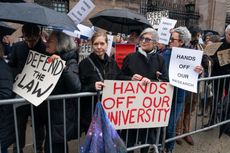 America's academic brain drain has begun
America's academic brain drain has begunIN THE SPOTLIGHT As the Trump administration targets universities and teachers, educators are eying greener academic pastures elsewhere — and other nations are starting to take notice
By Rafi Schwartz, The Week US Published
-
 Why is Musk targeting a Wisconsin Supreme Court race?
Why is Musk targeting a Wisconsin Supreme Court race?Today's Big Question His money could help conservatives, but it could also produce a Democratic backlash
By Joel Mathis, The Week US Published
-
 How to pay off student loans
How to pay off student loansThe explainer Don't just settle for the default repayment plan
By Becca Stanek, The Week US Published
-
 'Seriously, not literally': how should the world take Donald Trump?
'Seriously, not literally': how should the world take Donald Trump?Today's big question White House rhetoric and reality look likely to become increasingly blurred
By Sorcha Bradley, The Week UK Published
-
 Will Trump's 'madman' strategy pay off?
Will Trump's 'madman' strategy pay off?Today's Big Question Incoming US president likes to seem unpredictable but, this time round, world leaders could be wise to his playbook
By Sorcha Bradley, The Week UK Published
-
 Democrats vs. Republicans: who are the billionaires backing?
Democrats vs. Republicans: who are the billionaires backing?The Explainer Younger tech titans join 'boys' club throwing money and support' behind President Trump, while older plutocrats quietly rebuke new administration
By Harriet Marsden, The Week UK Published
-
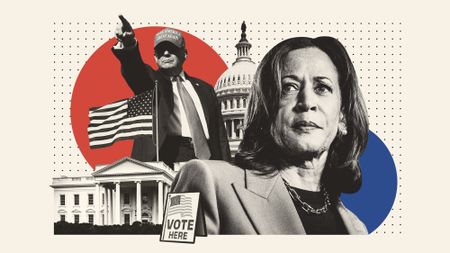 US election: where things stand with one week to go
US election: where things stand with one week to goThe Explainer Harris' lead in the polls has been narrowing in Trump's favour, but her campaign remains 'cautiously optimistic'
By Harriet Marsden, The Week UK Published
-
 Is Trump okay?
Is Trump okay?Today's Big Question Former president's mental fitness and alleged cognitive decline firmly back in the spotlight after 'bizarre' town hall event
By Harriet Marsden, The Week UK Published
-
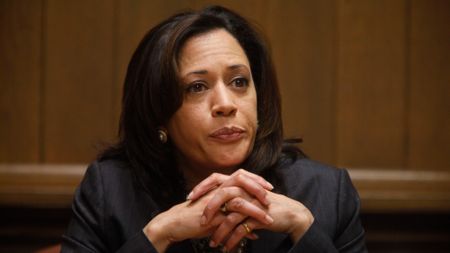 The life and times of Kamala Harris
The life and times of Kamala HarrisThe Explainer The vice-president is narrowly leading the race to become the next US president. How did she get to where she is now?
By The Week UK Published
-
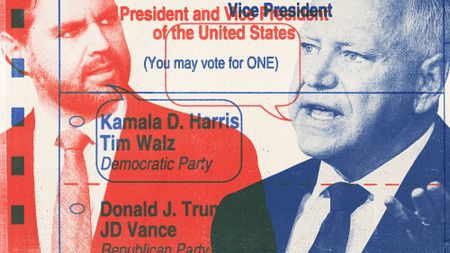 Will 'weirdly civil' VP debate move dial in US election?
Will 'weirdly civil' VP debate move dial in US election?Today's Big Question 'Diametrically opposed' candidates showed 'a lot of commonality' on some issues, but offered competing visions for America's future and democracy
By Harriet Marsden, The Week UK Published
-
 1 of 6 'Trump Train' drivers liable in Biden bus blockade
1 of 6 'Trump Train' drivers liable in Biden bus blockadeSpeed Read Only one of the accused was found liable in the case concerning the deliberate slowing of a 2020 Biden campaign bus
By Peter Weber, The Week US Published